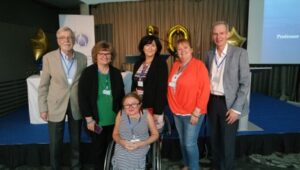Osteogenesis imperfecta (OI) is the commonest inherited cause of fragility. The key feature at tissue level is the increased mineralisation density of bone tissue, resulting in bone becoming brittle. Not surprisingly the alternative name for osteogenesis imperfecta is “brittle bone disease”.
 Over the last two decades the genetic origins of the disease have been elucidated in increasing detail, providing insights not only into collagen biochemistry but also other key processes involving osteoblast function as well as some changes where the precise mechanisms by which mutation leads to disease are yet to be determined. More than 20 different genes have now been identified in which mutations can result in the osteogenesis imperfecta phenotype. However, the phenotype-genotype correlation is limited (except for specific sub-types such as Type V) and clinical management typically reflects disease severity and the consequent effects on day-to-day life. Understanding disease-creating mechanisms in more detail holds out the prospect of targeted therapies in the future, but for now pharmacological treatment approaches still focus on increasing overall bone mass, rather than, for instance, altering bone material properties.
Over the last two decades the genetic origins of the disease have been elucidated in increasing detail, providing insights not only into collagen biochemistry but also other key processes involving osteoblast function as well as some changes where the precise mechanisms by which mutation leads to disease are yet to be determined. More than 20 different genes have now been identified in which mutations can result in the osteogenesis imperfecta phenotype. However, the phenotype-genotype correlation is limited (except for specific sub-types such as Type V) and clinical management typically reflects disease severity and the consequent effects on day-to-day life. Understanding disease-creating mechanisms in more detail holds out the prospect of targeted therapies in the future, but for now pharmacological treatment approaches still focus on increasing overall bone mass, rather than, for instance, altering bone material properties.
 Most centres specialising in the care of OI patients therefore adopt a multidisciplinary approach in order to meet the wide range of patient’s needs. The application of this approach has been most notable in centres dealing with children; centres seeing primarily adults are now beginning to adopt similar methods of working. The need for a holistic approach is clear when considering the range of problems that affected individuals have with mobility, day-to-day activities, dental issues, surgical interventions affecting the limbs, spine and base of skull, fatigue and pain, as well as the ever present risk of fracture.
Most centres specialising in the care of OI patients therefore adopt a multidisciplinary approach in order to meet the wide range of patient’s needs. The application of this approach has been most notable in centres dealing with children; centres seeing primarily adults are now beginning to adopt similar methods of working. The need for a holistic approach is clear when considering the range of problems that affected individuals have with mobility, day-to-day activities, dental issues, surgical interventions affecting the limbs, spine and base of skull, fatigue and pain, as well as the ever present risk of fracture.
The application of this approach has been accelerated by the trials of anabolic therapies using both PTH and anti-sclerostin antibodies in adults where quality of life data have been systematically collected. There are on-going efforts, notably the Key4OI initiative, to define outcomes for patients and services that may help the development of guidelines for care. We also are beginning to understand that, particularly in children, quality of life is described similarly in different OI populations across the world. The development of the OI-QoL or OI Quality of Life Tool, soon to be further validated for both children and adults, represents an important step towards measuring quality of life that will have relevance both for health services and for research interventions. Perhaps the biggest stimulus to the more widespread application of the MDT approach has been the strong voice from the OI community through both national and international representative organisations. The UK Charity Brittle Bone Society, the OI Federation Europe, and the OI Foundation in the USA have all been strong supporters of and contributors to advancements in the field over the last 50 years and we hope they will continue to do so as new technologies and approaches for OI emerge. Specifically, the Brittle Bone Society have supported many tools and projects to gather data for OI including promotion of notable surveys by the James Lind Alliance, the RUDY study and EuRRBone. The BBS have also long been advocating the need for clinical care guidelines for OI, and campaigning for improved adult OI healthcare. The Charity hope for an MDT service for adults. If a new service is achieved then this would benefit not only OI but other rare bone conditions including HPP, XLH, Fibrous Dysplasia and other rare bone disorders.

Left to Right: Dr Francis Glorieux, Tracy Hart CEO of OIF, Ingunn Westerheim, President of OIFE, Patricia Osborne CEO of Brittle Bone Society and Elaine Healey Chairman of Brittle Bone Society and Prof Nick Bishop.
